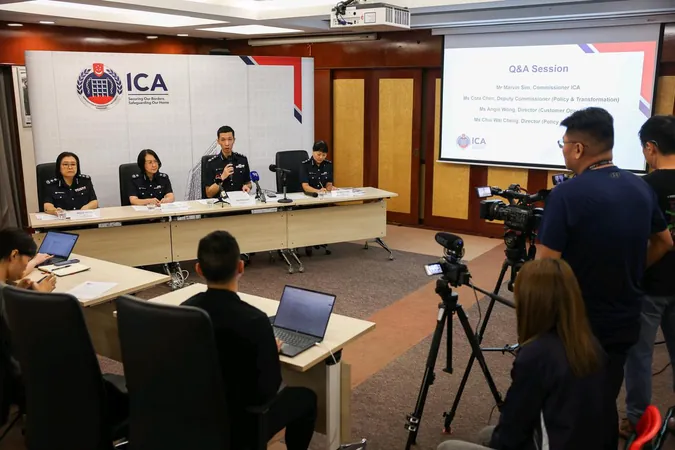
ICA Halts Online Address Change Feature After Major Scams Targeting Singaporeans
2025-01-11
Author: Jia
ICA Halts Online Address Change Feature After Major Scams Targeting Singaporeans
In a shocking turn of events, the Immigration and Checkpoints Authority (ICA) of Singapore has temporarily suspended its online change of address service after discovering that the home addresses of around 80 individuals were altered without their consent. The alarming breaches are the result of scammers exploiting compromised Singpass accounts, putting personal security in jeopardy.
Initially, the ICA became aware of a handful of unauthorized address changes reported in 2024. However, as investigations continued, the agency noticed a disturbing increase in cases, indicating that this method is becoming a favored tactic among crime syndicates targeting unsuspecting victims.
The investigation was launched back in September 2024 when reports of unauthorized address alterations began to spike. All holders of the NRIC (National Registration Identity Card) in Singapore are obligated to notify changes in their residential address within 28 days of relocating, whether their new home is inside or outside the country. Violators of this requirement can face hefty penalties, including fines up to $3,000 and potential imprisonment.
In an effort to streamline the address updating process, ICA introduced the online change of address feature in 2020, allowing users to easily amend their details through a secure e-service accessible via Singpass. To ensure the legitimacy of changes, applicants were required to enter a unique PIN sent to their new address via traditional mail.
The red flag was raised when the ICA began receiving multiple reports in September about unauthorized address changes. By December, it came to light that 75% of these attempted alterations were successful, executed through an elaborate scheme where scammers leveraged stolen or compromised Singpass credentials to infiltrate the e-service.
These criminals also had access to the victims' NRIC numbers and dates of issue, enabling them to manipulate the verification process. This nefarious tactic allowed scammers to redirect crucial PIN mailers to addresses they had illegitimately substituted. Consequently, the perpetrators could reset victims' Singpass passwords and gain full access to their accounts.
According to the ICA, these organized crime activities are likely being conducted through networks of compromised Singpass accounts, which are being used to create more mule accounts for further scams and cybercrimes. As a reactive measure, the ICA has halted the online address changing function to implement more robust security protocols.
The agency plans to conduct a thorough review and anticipates that this service may resume as soon as January 14, 2025, alongside the introduction of enhanced measures like face verification technology to bolster the security of the Singpass login process. This will significantly reduce the likelihood of unauthorized access to the service from compromised accounts.
For those who require help in reporting or addressing issues, the ICA's IC Unit is available for support at the ICA Building. The authority is advising all citizens to vigilantly check their registered addresses and report any suspicious changes to safeguard their personal information.
As the digital landscape continues to evolve, so do the tactics employed by cybercriminals. Staying informed and proactive is key in protecting oneself against such malicious schemes.





 Brasil (PT)
Brasil (PT)
 Canada (EN)
Canada (EN)
 Chile (ES)
Chile (ES)
 Česko (CS)
Česko (CS)
 대한민국 (KO)
대한민국 (KO)
 España (ES)
España (ES)
 France (FR)
France (FR)
 Hong Kong (EN)
Hong Kong (EN)
 Italia (IT)
Italia (IT)
 日本 (JA)
日本 (JA)
 Magyarország (HU)
Magyarország (HU)
 Norge (NO)
Norge (NO)
 Polska (PL)
Polska (PL)
 Schweiz (DE)
Schweiz (DE)
 Singapore (EN)
Singapore (EN)
 Sverige (SV)
Sverige (SV)
 Suomi (FI)
Suomi (FI)
 Türkiye (TR)
Türkiye (TR)
 الإمارات العربية المتحدة (AR)
الإمارات العربية المتحدة (AR)